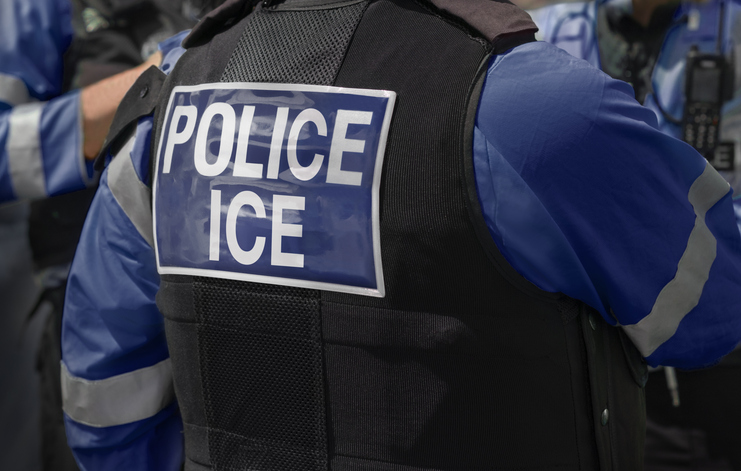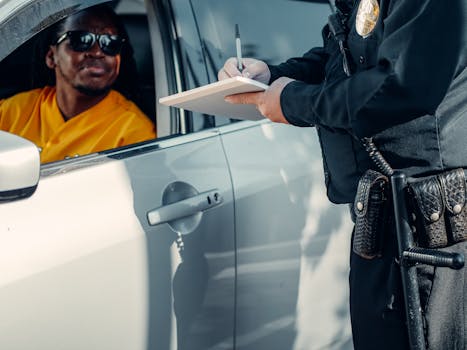By Richard T. Herman
Does the Judge’s Order Apply Nationwide?
Quick Answer
Yes — but only partly.
The November 6, 2025 injunction by U.S. District Judge Sara Ellis applies specifically to federal immigration operations in the Northern District of Illinois (Chicago area).
It is not yet a nationwide order, but its constitutional logic is precedent-setting. Other federal courts can cite it to restrict ICE or Border Patrol tactics elsewhere.
Full Court Order:
Read Judge Sara Ellis’s Preliminary Injunction (Nov 6 2025)
In short:
- Applies directly: Chicago-area ICE and Border Patrol actions.
- Persuasive nationwide: Other judges can adopt its reasoning.
- Why it matters: It’s the first modern ruling to hold DHS and its agents legally accountable for unconstitutional violence in immigration operations.
- No tear gas or pepper-balls unless “immediate threat”; two warnings; visible ID; body-cams. The ruling mandates that federal agents wear body-worn cameras to document incidents, requires at least two separate warnings before deploying riot control weapons, and bans certain chokeholds and restraints.
Richard T. Herman:
“This order isn’t confined by geography—it’s already reshaping how America thinks about immigration enforcement and the Constitution.”
FAST FACTS / At-a-Glance
| Key Detail | Information |
|---|---|
| Ruling Date | November 6 2025 |
| Judge | U.S. District Judge Sara L. Ellis |
| Court | Northern District of Illinois (Chicago) |
| Focus | ICE / Border Patrol use of force during raids and protests |
| Restrictions | No tear gas or pepper-balls unless “immediate threat”; two warnings; visible ID; body-cams |
| Defendants / Plaintiffs | DHS, ICE, CBP / Journalists, Clergy, Protesters |
| Operation Name | “Operation Midway Blitz” (Sept–Nov 2025) |
| Core Finding | Government testimony “simply not credible”; force “shocks the conscience.” |
| Official Order | View Full Order on Herman Legal Group Site |
Introduction — Why Chicago Matters
For months, Chicago’s immigrant neighborhoods lived under what many described as a militarized enforcement campaign. Agents in riot gear swept through communities, deploying chemical weapons near homes and churches.
For months, Chicago’s immigrant neighborhoods lived under what many described as a militarized enforcement campaign. Agents in riot gear swept through communities, deploying chemical weapons near homes and churches. Witnesses in court described experiences of being shot with pepper balls and having guns pointed at them by federal agents. Judge Sara Ellis issued a preliminary injunction in Chicago that places permanent restrictions on the use of force by federal immigration agents during “Operation Midway Blitz.”
The decision, while local, now serves as a moral checkpoint for America’s immigration enforcement strategy.
What the Judge Actually Said
1. “Shocks the Conscience”
Judge Ellis condemned the conduct of federal agents as behavior that “shocks the conscience,” citing excessive and indiscriminate use of tear gas and pepper-balls against unarmed civilians.
“Pointing guns, pulling out pepper spray, throwing tear gas … do not appear to be appropriate responses.”
2. Credibility Collapse of DHS
Her order states plainly:
“The Court finds the testimony of Commander Bovino simply not credible.”
Video evidence directly contradicted sworn statements. The judge wrote that Bovino admitted under oath that he lied about being struck by a rock before ordering tear gas. These credibility findings implicate DHS leadership’s integrity, suggesting a deliberate effort to mislead the court.
3. Violent Conduct Against Non-Threatening Civilians
The order detailed how agents deployed chemical agents in residential zones, tackled non-resisting individuals, and even fired pepper-balls at journalists documenting raids. Witness testimonies of excessive force used against protesters and media during the operation were pivotal in informing the ruling.
Judge Ellis called the government’s portrayal of Chicago as “overrun by rioters” a “gross exaggeration unsupported by evidence.”
4. The Emotional Core
The judge opened her order quoting Carl Sandburg’s poem “Chicago.”
She contrasted the city’s resilience and humanity with the government’s fear-based narrative, writing:
“Chicago, proud and alive, cannot be the stage for constitutional neglect.”
Her writing humanized immigrants and protestors not as agitators but as residents entitled to dignity.
Why This Ruling Is So Significant
1. Constitutional Line in the Sand
For decades, immigration enforcement occupied a gray zone with limited constitutional oversight. This ruling draws a clear line: the Bill of Rights applies to ICE and CBP operations. The ruling’s specific requirements, like the use of body cameras, giving warnings before deploying crowd control measures, and banning certain chokeholds and restraints, could be applied to other federal agencies as well. The ruling also acknowledges due process protections for individuals regarding ICE’s practices of warrantless arrests.
2. Judicial Rebuke of Deception
By finding DHS officials misrepresented facts, the court implicitly questioned the agency’s truthfulness — a rarity in federal litigation.
3. National Precedent Potential
Other courts may use Ellis’s reasoning to impose similar constraints. Legal scholars already call it the “Chicago Doctrine” for immigrant-rights litigation. The Chicago district court rulings could encourage similar lawsuits in different circuits or as class-action lawsuits for those affected by CBP’s actions.
4. Human Resonance
Families who lived in fear now have judicial acknowledgment of their trauma. Witnesses from the community have described anxiety and fear in relation to participating in protests due to federal enforcement actions. Community leaders have reported incidents of fear among immigrant populations due to federal enforcement actions in their neighborhoods.
Expert Insight:
“Courts don’t often validate community pain,” says Dr. Maria Garcia. “This one did.”
Did DHS Lie to the Court?
Yes, according to the judge’s findings. Judge Ellis wrote that Border Patrol leadership “provided false statements” and that DHS counsel “failed to correct known inaccuracies.”
This level of judicial censure is extraordinary — it suggests institutional deceit rather than isolated misjudgment.
Her rebuke effectively accuses DHS of concealing unconstitutional acts, potentially exposing agents to internal investigation or even perjury review.
The Violence She Described
Judge Ellis’s 47-page opinion describes moments of violence that feel cinematic — and horrifying.
- Agents fired tear gas into a crowd including clergy and children.
- Journalists were shoved and their cameras seized.
- Protesters were tackled despite posing no threat.
- Residents reported pepper-balls entering open apartment windows. Federal agents are barred from using riot control weapons against peaceful protesters unless there is an immediate threat.
She concluded: “The Constitution does not permit federal officers to terrorize the public under the guise of enforcement.”
Richard T. Herman:
“Her words pierce the bureaucracy. They call violence by its name — and that’s revolutionary in immigration law.”
Political Backdrop
Vice President J.D. Vance’s comments in September 2025 — “take back control of our cities” — aligned with the Project 2025 blueprint advocating for “reassertion of federal policing authority.”
Judge Ellis’s injunction effectively stops that vision at the Chicago city line. It warns that federal enforcement, however political, must stay within constitutional limits.
Practical Guidance for Immigrants and Advocates
✅ Demand identification: Agents must show visible ID under this order.
✅ Document interactions: Record time, place, names, and videos if safe.
✅ Report violations: File complaints with civil-rights offices or legal counsel.
✅ Know your rights: You may remain silent and request a lawyer.
✅ Consult professionals: Book a consultation with Herman Legal Group.
What Comes Next
- Appeal likely: DHS expected to seek a stay before the 7th Circuit.
- Policy reform: DHS may revise use-of-force guidelines nationwide to preempt copycat rulings.
- Local monitoring: Immigrant groups are establishing rapid-response teams to track compliance.
- Possible Congressional review: Senators from Illinois have requested hearings into federal misconduct.
- Extended oversight: Federal judges have extended court oversight of ICE operations to enforce legal standards on warrants and use of force.
FAQ
1. Does the order apply nationwide?
Not formally. It binds operations in Illinois but serves as persuasive precedent nationwide.
2. Why did the judge issue it?
She found credible evidence that ICE/CBP violated constitutional rights and misled the court.
3. What is Operation Midway Blitz?
A multi-agency immigration enforcement campaign launched in 2025 targeting “illegal entrants,” involving riot-gear units.
4. What were the worst abuses?
Use of tear gas and pepper-balls on non-threatening civilians, arrests without warrants, and obstruction of press.
5. Did DHS officials lie?
Yes — Commander Bovino admitted he fabricated being hit by a rock.
6. What constitutional amendments were invoked?
First (Free Speech / Press / Assembly) and Fourth (Search & Seizure).
7. How long does the injunction last?
Until trial or further court order; may extend indefinitely if upheld.
8. Can ICE appeal?
Yes, and DHS has already announced intent to appeal.
9. What happens if agents violate the injunction?
They risk contempt sanctions or personal liability.
10. Will this slow down deportations?
Possibly. Enforcement must now include advance warnings and documentation.
11. How does this affect protests?
Agents must treat protesters as civilians with rights, not security threats.
12. Can media safely cover immigration raids?
Yes — journalists now enjoy explicit protection under the order.
13. Does this change state or local police behavior?
Not directly, but local agencies cooperating with DHS may mirror these rules.
14. Could Congress override the order?
No — only higher courts can modify it.
15. Are similar suits pending elsewhere?
Yes — in Los Angeles and El Paso, citing identical constitutional arguments.
16. What does “shocks the conscience” mean legally?
A standard meaning the conduct is so egregious it violates fundamental fairness.
17. Why was Judge Ellis’s tone so strong?
Because the evidence showed deliberate deception, not mere negligence.
18. Will agents face discipline?
Possible; the Office of Inspector General has authority to investigate perjury.
19. How does this tie into Project 2025?
The ruling undermines the blueprint’s plan to expand federal control over sanctuary cities.
20. Where can immigrants learn their rights?
See the Resource Directory below for verified organizations and legal help.
Resource Directory
Official Government Resources
- Full Court Order: Herman Legal Group — Chicago Decision Page
- U.S. Courts Portal: uscourts.gov — Case lookup and dockets.
- DHS Office for Civil Rights & Civil Liberties: https://www.dhs.gov/crcl
Immigrant & Community Organizations
- Illinois Coalition for Immigrant and Refugee Rights: icirr.org
- National Immigration Law Center: nilc.org
- American Immigration Council: americanimmigrationcouncil.org
- ACLU Immigrants’ Rights Project: aclu.org
Legal Representation and Consultation
- Herman Legal Group: Book Consultation Here
- National Immigration Lawyers Directory: aila.org
- Pro Bono Legal Services in Illinois: immigrantjustice.org
Know Your Rights Guides
- ICE Raids Toolkit: immdefense.org/know-your-rights
- ACLU “Know Your Rights” Series: aclu.org/know-your-rights
Key Takeaways
- The Chicago injunction applies locally — but its impact is national.
- Judge Ellis’s findings expose deception and brutality within DHS ranks.
- Courts are re-drawing the line between enforcement and abuse.
- Immigrants, journalists, and advocates now have a tested legal shield.
- Herman Legal Group continues to defend immigrant rights under these evolving laws. The injunction sets a precedent that could influence future legal challenges to similar tactics in other cities.
About Richard T. Herman

Richard T. Herman, founder of the Herman Legal Group, has over 30 years of experience representing immigrants nationwide in family, employment, and deportation defense.
Schedule a consultation to discuss how this ruling may affect you.





